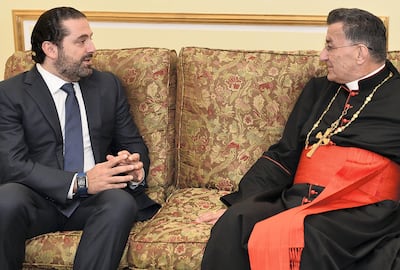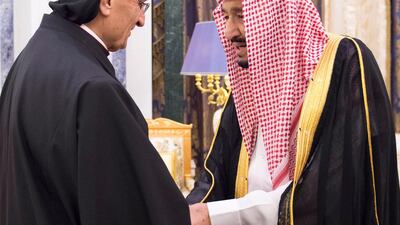Saad Hariri said he would return to Lebanon within days, while his office responded to claims from an Iranian official about a meeting in Lebanon that took place before he resigned his premiership.
Mr Hariri told his Twitter followers he was in good health and urged the Lebanese people to be calm. He said his family would stay in Saudi Arabia, calling it "their country". Mr Hariri announced his resignation from Riyadh last week.
He blamed fear of assassination for his resignation and criticised Iran's influence in Lebanon and other Arab states.
Lebanese president Michel Aoun said he will not accept the resignation until Mr Hariri returns to Beirut to formally submit it.
The resignation speech in Riyadh came a day after he met Ali Akbar Velayati, a senior adviser to Iranian leader Ayatollah Ali Khamenei, in Beirut on November 3.
“Prime minister Hariri did not offer to mediate between any country and another, rather he expressed to [Ali Akbar] Velayati his point of view, which is the need to stop Iran’s intervention in Yemen as a first step and a precondition to any improvement of the relations between Iran and the kingdom of Saudi Arabia,” Mr Hariri’s office said on Tuesday.
_______________
Read more
Iran and Hizbollah brought Lebanon to brink of collapse
Lebanese president 'happy to hear' Hariri will soon return to country
Iran and Hizbollah are plunging Lebanon into a fresh crisis
_______________
Mr Velayati claimed earlier on Tuesday that Mr Hariri offered to act as a mediator between Iran and Saudi Arabia, which opposes Iran's expansion in the region. The rivalry has played out in the conflicts in Syria and Yemen and has more recently threatened to destabilise Lebanon.
The back-and-forth between the two began on Sunday, when Mr Hariri made his first public comments since resigning.
“As for my meeting with Velayati, I clearly talked about the unacceptable Iranian interferences in the Arab countries and that we cannot continue while Iran and a political party are interfering in the Arab countries,” he said during a television interview in Riyadh.
“Political party” refers to Hizbollah, the Iranian-supported militia and party that wields great influence in Lebanon and has long been at odds with Mr Hariri’s Future Movement. In 2011, during Mr Hariri’s first term as prime minister, Hizbollah withdrew from Mr Hariri’s government, forcing its collapse.
Hizbollah members have been accused by a United Nations tribunal in The Hague of assassinating Mr Hariri's father. Former prime minister Rafik Hariri and 21 others were killed in a car bombing in Beirut in 2005.
It was a dispute over the legitimacy of the tribunal that led to Hizbollah’s withdrawal.
The war in Syria changed the calculus of Lebanese politics by 2016, when Saad Hariri began a new term as prime minister and entered a consensus government with Hizbollah. Mr Hariri's resignation abruptly put an end to the détente, and his supporters have claimed that it was coerced by Saudi leaders in order to pressure Iran in Lebanon, rather than a decision made by Mr Hariri himself.
Mr Hariri, whose father made a fortune as a construction magnate in Saudi Arabia, has close ties to the country and also carries a Saudi passport.
On Sunday, Mr Hariri called for all Lebanese parties to adhere to Lebanon’s policy of “disassociation” with regard to regional affairs. The call was directed at Hizbollah, which has sent thousands of volunteers to fight on behalf of the Syrian government in that country’s six-year-old civil war.
Hizbollah has become a critical player in helping the Syrian government beat ISIL and the rebels seeking the overthrow of president Bashar Al Assad, making disengagement by the group there unlikely.
Mr Hariri also met on Tuesday with Bechara Al Rai, the leader of Lebanon’s Maronite church, who had planned to visit Saudi before Mr Hariri’s resignation.

Visits by leaders of religious orders are rare in Saudi Arabia, where the practice of any religion besides Islam is officially illegal. Patriarch Al Rai's trip was the first to Saudi by a senior Christian in more than 40 years, according to the Saudi Press Agency.
Patriarch Al Rai also met King Salman and Crown Prince Mohammed bin Salman.
Al Arabiya quoted the patriarch as saying he supported the reasons for Mr Hariri's resignation.
"Patriarch Bechara Al Rai's … visit stresses the kingdom's approach for peaceful coexistence, closeness and openness for all sections of Arabic people," Saudi Gulf affairs minister, Thamer Al Sabhan, said on Twitter.
Upon his arrival, the patriarch met members of the Lebanese community.
"We will maintain a strong friendship between Saudi Arabia and Lebanon," he said. "This is our history even if we have had stormy relations sometimes. [There] is a history of friendship with this dear kingdom."
*Additional reporting by Reuters

